














Mission
St Michael’s College is a Catholic school in the Lasallian tradition which is committed to the human and Christian education of the young, especially the poor*, through Community, Challenge, Choice.
Community
We are an inclusive and respectful community where each individual is known, valued and cared for, enabling them to feel confident to explore their curiosities, flourish and fully realise their potential.
Challenge
Individual growth is achieved through engagement, opportunity and recognition, underpinned by a positive learning culture that is authentic, challenging and supportive.
Choice
Through a quality Lasallian education, inspired by the Gospel and a concern for social justice, students are empowered to better choose who they become as people, learners and leaders in the world.
* The Lasallian school calls its members to an awareness of the poor and victims of injustice, and responds to their needs through programs of community service, advocacy and justice education.
St Michael’s College is dedicated to a whole of College approach to facilitate our Catholic and Lasallian educational experience. Our strong heritage is based on the principles of 300 years of Lasallian Education, guided by the De La Salle Brothers and our Founder’s teachings.
A member of the global Lasallian family, St Michael’s College is committed to create a welcoming, inclusive Lasallian community, aligned with strategic commitment to optimise student experiences and outcomes.
Our commitment is to provide opportunities that will prepare students to be compassionate and enthusiastic participants in society who prioritise service to others, especially the marginalised and those in need. Guided by Lasallian teachings, enriched by contemporary educational theory and practices, students, staff and families are empowered to flourish and find success.


St Michael’s College is a Reception to Year 12 Catholic college in the Lasallian tradition, founded in 1954 by the De La Salle Brothers. Located in the western suburbs of Adelaide, St Michael’s College comprises two campuses. The Primary Campus is based on the original school site at Beverley with the Secondary Campus located at Henley Beach.
Currently one of the largest Catholic colleges in South Australia, in 2024, St Michael’s College has 2128 enrolled students. The Primary Campus has moved to a four-stream model in 2024, with 512 enrolled students. With the introduction of coeducation in the Reception setting from 2021, the College will be fully co-educational by 2027.
The Secondary Campus has been entirely coeducational since 2008 and comprises a Middle School (Years 7 – 9) and Senior School (Years 10 – 12) structure.
The St Michael’s College community is comprised of a diverse range of cultural, social, and religious backgrounds all aspiring to a common purpose. The staff, students, and families of St Michael’s work together to create an inclusive and respectful community where each individual is known, valued and cared for. This strong and vibrant partnership creates an environment that enables each person to feel confident to explore their curiosities, likes and interests to flourish and to fully realise their potential.
Through a quality Lasallian education inspired by the Gospel and a genuine concern for social justice, St Michael’s students are empowered to choose who they become as people, learners and leaders in the world.
Governance of St Michael’s College now rests with the Board of Directors under formal agreements constituted with the Trustees of the De La Salle Brothers. St Michaels’ College is systemically funded by an agreement between the College Board and the South Australian Commission for Catholic Schools.



The children in your care are a letter which Christ dictates to you, which you write each day in their hearts, not with ink, but with the Spirit of God.
St John Baptist de La Salle, 1680
A total of 2128 students were enrolled at St Michael’s College in 2024. Please refer to the breakdown below;



(Including Midyear Reception)
Of these 57.9% were male and 42.1% female
*Noting that in 2024 Year 4, 5 & 6 comprised male only students. Twenty two students or (1.03%) were Indigenous with 27 students or (1.27%) with English as an Additional Language / Dialect (EAL/D).
In addition, the Inclusive Education faculty provided for the needs of 279* students with disabilities as assessed for the purposes of the Nationally Consistent Collection of Data (NCCD). This represents 13.1% of the 2024 student cohort.
*NCCD Funded
The table below indicates student attendance for 2024:
In 2024, College income comprised Government funding, contributions from families and a number of other private sources. Please refer to the table below for a break down:
Tuition fees, charges and parent contributions $19,060,907
Less: Discounts and remission $(1,865,442)
Australian Government recurrent funding $ 22,777,411
State/Territory recurrent funding $ 6,371,954
Other Government Grants $ 155,768
Other Operating Revenue $ 865,140
Capital Grant $ 1,200,000
TOTAL net income $ 48,565,738
The College’s DMI (direct measure of income) was 104 in 2024. This score is used to determine the level of Government funding received.
School attendance is managed and recorded using SEQTA, the College Learning Management system. Student absence is monitored closely and followed up as necessary. Absences recorded by the Pastoral Care teacher are monitored by the administration team. An automated SMS is sent to parents if there is an unexplained absence and Year Level Directors are provided with absentee lists daily.
Patterns of lateness or continued absences are also monitored by the Year Level Directors, Deputy Principal – Pastoral and the School Transition and Engagement Coordinator. Attendance data is used to inform action with a range of strategies and support structures in place if required.

College staff hold qualifications relevant to their positions and all teaching staff are registered with the South Australian Teachers Registration Board. All staff of St Michael’s College are expected to meet the requirements outlined in their position information document. A commitment to uphold and contribute to the Lasallian ethos, participate in professional development activities, and establish positive and effective relationships within the College community are but a few of the high expectations of all staff. New teaching staff, permanent or contract employees complete the CESA Teacher Induction module at commencement of their employment and permanent staff are required to complete the Graduate Certificate in Catholic Education within the first five years of employment.
The St Michael’s College staff are highly qualified in their chosen field and beyond as depicted in the sample profile of additional qualifications held by college staff:
30% of Staff have degrees
26% of Staff possess post graduate qualifications
41% of Staff hold master’s degrees
• PhD in Microbiology
• Masters of Teaching
• Masters of Catholic Education
• Masters in Fitness/Personal Training
• Masters in Applied Theatre Studies
• Masters of Educational Leadership
• Masters of Business Administration
• Masters of Primary Education
• Masters of Economics
• Masters of Speech Pathology
• Graduate Degree in Sociology
• Bachelor of International Studied
• Bachelor of Marine Biology
• Bachelor of Applied Science (Human Movement)
• Bachelor of Psychology
• Bachelor of Visual Communication (Graphic Design & Illustration)
• Diploma in Nutrition
• Cabinetmaking & Carpentry qualifications
St Michael’s College Strategic Direction addressing ‘People, Leadership and Culture’ states the College’s role in, “Investing in the wellbeing, development and contribution of staff to offer a satisfying, fulfilling connection to the College and positive Catholic and Lasallian organisational culture.”
All Teaching staff and Education Support Officers (ESOs) participate in various learning opportunities, either manager recommended or self-identified. Teaching staff engaged with a range of safety, risk and compliance training as well as upskilling in Smart Lab, the School Wide Literacy program and use of the Track One platform to inform teaching with evidence based data.
In 2024, secondary teaching staff engaged in group professional learning throughout the year. Personal Professional Learning Plans (PPLPs) are guided by AITSL’s ‘Enabling the High-Quality Professional Learning Cycle’ and the Australian Charter for the ‘Professional Learning of Teachers and School Leaders,’ emphasizing relevance, collaboration, and a future focus. PPLPs may include accredited study, seminars, courses, mentoring, participation in professional learning teams, professional reading, or online learning, each led by experienced staff. An end-of-year professional learning showcase highlighted diverse learning experiences and the willingness of staff to share knowledge, from seasoned educators to first-year teachers. This approach ensures continuous professional growth and community engagement, aligning with the strategic direction of promoting personal and collective development.



Sample of Professional Development undertaken by staff in 2024:
• Lasallian Compass
• Together for Mission
• SASUI - Braille & Tactile
• CESA Aspiring Leaders
• AHISA - Leading, Learning & Caring Conference
• SACE Curriculum Design, Curriculum Forums, Assessment and Marking across many learning areas
• 2024 Women’s Leadership Symposium
• CESA Growing Faith Leaders
• Ruby Laser Cutting
• Dare to Lead
• A range of Learning area state and nationals conferences
• Limitless Possibilities - Social Entrepreneurial Project Based Learning Workshop
• Assoc of Counsellors - Whole school wellbeing approach
• CESA - Leaders of Learning Network
• ACEL SA - SA Schools Equity Summit
• Educate Plus - Empowering Success International Conference
• Adelaide SEC - Cyber Security Conference
• Xcursion - Camps & Excursions Risk Management
• Emergency Warden Training
• Generative AI In Education
• DATTA - STEM Conference



National Assessment Program Literacy and Numeracy (NAPLAN)
Upon completion of NAPLAN Testing this year, the following results were achieved:

Year 3 NAPLAN Results


Year 5 NAPLAN Results
Year 7 NAPLAN Results
Year 9 NAPLAN Results



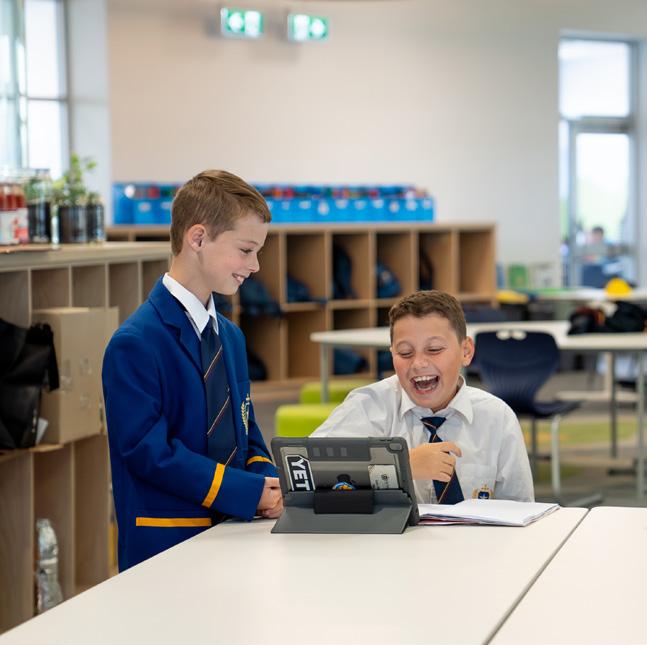
The SACE accomplishments of the Class of 2024, along with the release of their ATAR scores, were celebrated. These results mark the culmination of years of hard work, personal development, and academic excellence. Congratulations are extended to all students for their dedication, determination, resilience, and commitment throughout their educational journey. This milestone was made possible through the steadfast support of their families, teachers, and the entire College community.
SACE Completion
55%
Number of students with ATAR
% of eligible students with an ATAR above 95
Number of students with ATAR above 90
% of eligible students with an ATAR above 90
Number of students with ATAR above 80
% of eligible students with an ATAR above 80
and A+
Number of Subjects with Merits
Number of A+
Number of Students with A+
Number of Subjects with A+
Indira Burns, ATAR 99.15, with four A+ grades, including three Merits.
Proxime Accessit
Cassidy Kilgallon, ATAR 99.1, with four A+ grades including 1 Merit, and a “perfect” 20/20 for University Studies.
This year’s SACE results represent an outstanding achievement by the Class of 2024. A total of 82 A+ grades were achieved by 59 remarkable students. These high achieving students have demonstrated exceptional skill, knowledge and mastery across various subjects, setting a standard of excellence that inspires their peers and future students.
The achievements are further highlighted with 34 Merits awarded to 28 students across 12 different subjects. These Merit Certificates were presented at Government House and represent outstanding achievement in their respective subjects.
• An outstanding 44% of all grades allocated were in the A Band.
• 554 A grades were achieved with 106 students scoring three or more A’s.
• 72 students achieved an A grade in four (or more) Stage 2 subjects studied.
• 88% of all grades allocated were A’s or B’s. The strong level of academic achievement is reflected in the students’ ATAR scores, with most students likely to secure their first-preference university courses. This success is a testament to their academic preparation, approach to learning, and the comprehensive educational foundation provided by the College.


Grade Percentages over time
St Michael’s continues to provide a broad selection of Year 12 subjects ensuring the needs of our diverse cohort of students are considered. This year, students completed over 50 different SACE Stage 2 subjects, 22 different university subjects and a wide variety of VET courses contributing to their SACE completion
VET continues to be an important and highly valued part of the educational offering at St Michael’s College. Enrolments into formal VET qualifications remain steady with the largest cohort being Year 11 with 48% of students participating. Of the 2024 Year 12 graduates, 47% participated in VET at SMC. 70% of Year 10 students participated in a VET experience during 2024 either with a Certificate qualification, immersion experience or the try-a-trade program.
Qualifications completed by Certificate Level in 2024
VET Qualifications Completed - by Certificate Level




(Continued)
The 2024 Year 12 graduating cohort of 253 students has achieved exceptional post-school outcomes that demonstrate the strength and diversity of St Michael's College's educational programs. With 100% SACE achievement and 80% of graduates pursuing university studies, our students have exceeded state averages while embracing diverse pathways that reflect our Lasallian mission of service and excellence.
In 2024 we had a significant increase from 4 students the previous year to 22 students successfully complete approved University subjects as part of their Year 12 experience.
• 100% of students achieved their SACE - a testament to our comprehensive support systems
• 89% chose subjects eligible for university entrance (ATAR)
• 80% of graduates are pursuing university studieswell above state averages
• 98% received offers to their first or second preference course
Universities of choice:
• University of South Australia: 47% of offers
• University of Adelaide: 32% of offers
• Flinders University: 20% of offers
Popular study areas reflect our students’ commitment to service and community impact:
• Health and Medical Sciences: 34%
• Law: 9.4%
• Engineering: 8.9%
• Business and Economics: 9.4%
• Education and Teaching: 7.4%
Diverse Pathways Alternative to University:
• 20% of graduates chose alternative pathways to university, including:
• 16 students in apprenticeships (combining schoolbased and post-graduation)
• Strong representation in construction, automotive, and electrical trades
• Employment in retail, hospitality, childcare, and individual care services
• Officer training at Australian Defence Force Academy (ADFA)
• Full basketball scholarship in the USA
• Professional sports careers (Basketball and AFLW)
• QANTAS Group Pilots Academy
• Self-employment in filmmaking
• Gap year experiences including Camp America and international travel
• 53% participated in Vocational Education and Training.
• 35% completed Certificate III qualifications that enhanced their university entrance scores.
The Class of 2024 represents the continued evolution of St Michael’s College graduates into confident, capable, and service-oriented young adults. The exceptional variety in post-school pathways, from traditional university studies to innovative gap year experiences, from competitive professional sports to defence service, demonstrates the success of our holistic educational approach.
The significant growth in health and medical sciences reflects both market opportunities and our students’ commitment to service—a core Lasallian value. Additionally, the success of our Higher Education program has provided students with enhanced university preparation and confidence.

Tertiary Pathways by Instituion



Flinders University
University of South Australia
ACC - Australian Chiropractic College
University of Adelaide
RTO (Registered Training Organsation)

Tertiary Study Pathways by Industry Category
St Michael’s College benefits greatly from a highly engaged parent community. Regular feedback is invited each year through parent and teacher interviews following term reports, weekly newsletters, year level parent information sessions and a diverse guest presenter education program.
Parents share in the development of many areas of the College including cocurricular sports and arts program, College events and the Parents and Friends Committee. Parents are also represented as members of the governing College Board and subcommittee, the Finance, Audit and Risk Management Committee. During 2024 parents and caregivers were invited to provide feedback about their experiences and perception of student experiences at the College via the National School Improvement survey, conducted by Curtin University.
The feedback was overwhelmingly positive, of particular note was an improvement in satisfaction with student/ parent Assessment and Feedback. Further constructs identified by families as strengths include:
• Staff Support
• Satisfaction with Child’s Progress
• Welcoming School Environment
• Affirming Diversity
• Communication
• Assessment and Feedback
• Satisfaction with the School
85% of parents answered ‘Agree’ or ‘Strongly agree’ to the statement, ‘Overall I am satisfied with what the school does for my child/ren,’ while to the provocation ‘I would recommend this school to others,’ 87% agreed or strongly agreed.
Staff
Teaching staff identified the following areas as strengths of the College:
• Work Engagement, Efficacy and Satisfaction
• Organisational climate
• School Mission
• Participation in decision making
• Providing Individual Support
• Encouraging Improvement of Practice
• Staff Collegiality
• Safe and Orderly Environment
• Home-School relations
• Parent/Caregiver Involvement
• Expectations for Success
• Respect
The following areas are considered as strengths of the College and Education Support Staff showed improvement in satisfaction in terms of:
• School Mission
• Home-School Relations
• Participation in Decision-making
• Staff Collegiality
• Safe and Orderly Environment
• Equity and Diversity
• Job Efficacy
• Job Satisfaction
Student feedback is gathered regularly via a number of sources. ORAH Mood Checks are a quick and responsive approach for the Primary years providing live data enabling immediate action and follow up by staff.
College wide PULSE surveys provide valuable insight into College wide and year level specific student wellbeing. 2024 Pulse survey data collection results were affirming indicating students feel connected to the College, feel that their learning needs are being met, have a positive sense of belonging, have positive relationships and overwhelmingly feel safe.
Collecting survey data enables Pastoral and Teaching Staff to stay informed about student engagement and wellbeing, ensuring that appropriate resources and support can be provided when needed. Additional resources, such as in-class support and counselling services, are accessible to all students.





1.

Strategic Goals and Continuous Improvement
2024 represented a second year of transformational change at St Michael’s College, underscored by the adoption of the Strategic Directions 2024 – 2027. In his second year as Principal, Tony Daley commenced the implementation of strategies and objectives developed during 2023, further embedding the College’s vision and mission. The holistic approach continued with the integration of the Pastoral Framework (R – 12) and the Teaching and Learning Framework (R – 12), College wide.



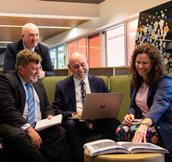







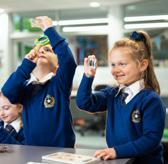


St Michael’s College hosted the Lasallian Leaders Gathering in March 2024. This event saw Lasallian delegates from across Australia, New Zealand, Pakistan and Papua New Guinea come together to connect and engage in meaningful discussion and shared purpose.
More than 30 staff were involved in Lasallian Formation with programs including Lasallian Compass, Together for Mission and Exploring our Heritage.
Br John Pill continued the Brother in Residence program throughout 2024 providing in-service formation with the College Board and workshops with staff and students.
College Captains and Vice Captains attended the Lasallian Student Leadership Seminar in January 2024, coming together with Lasallian students from across Australia.
A Lasallian Signage Project is underway across the College to increase the visual presence of our Lasallian narrative.
Aboriginal spirituality awareness and training was undertaken by all Staff culminating in a collective presentation from the Tjindu Foundation and City walk.
A Lasallian Methodology unit for the Graduate Certificate in Catholic Education with a school based unit is in the final stage of development and approval with Uni SA.
A College wide approach was taken during 2024 in the development of the Whole School Literacy Agreement that will be rolled out in 2025. The agreement was established to ensure that each learning area is responsible for developing students literacy capacity.
Significant developments at the Primary Campus include the introduction of InitialLit for early years literacy (R – 2).
Data informed practices include analysis of PAT-R, NAPLAN and Renaissance results with an emphasis on comprehension. Dibels screening introduced to align with ACARA achievement standards.

A Pedagogy Coach was appointed to work alongside early career teachers as they hone their practice and improve their confidence in the classroom.
The Maths Curriculum was re-written to assure alignment with Version 9 of the Australian Curriculum to ensure the authentic assessment and reporting of results.
Inclusive Education appointments made in 2024 included the Director of Inclusivity and Inclusive Education Pastoral Coordinator and the introduction of co-educators to provide in-class support in the Secondary setting.
A proposed refurbishment of the Uniform shop to house the Inclusivity Hub was accepted with construction to begin in early 2025. The centre will include meeting spaces, a sensory room and office space.
Seventeen scholarships were offered through the Beyond Borders Program throughout 2024, supporting refugee status students.
The Co-Curricular Program has expanded significantly at the Primary Campus with the introduction of a CoCurricular Committee and appointment of a dedicated coordinator. This has allowed for the inclusion of new sports and an emphasis on engagement and choice for students, particularly girls.
2024 has seen an increase in Co-Curricular sporting teams with over 100 teams participating in the summer and winter sports programs.
A Transition Program for Year 7 students has been developed with a focus on Primary students transitioning to the secondary school environment.
The Rite Journey was introduced across Year 9 and has provided students with a unique program designed to enhance students’ capacity to grow into responsible and resourceful young adults.
Professional partnerships have been established as part of the Talent Identification Program with Netball (Thunderbirds Partnership); Basketball (DJ Vasiljevic
and 3J Academy); Soccer (Adelaide United stars Isaias Sanchez and Sarah Morgan); Golf (Grange Golf Club) and Leadership (Bloom Leadership with Australian Diamonds netball captain Natalie von Bertouch and exPort Adelaide AFL captain Tom Jonas).
The College Immersion Program was reintroduced in 2024 with 38 students travelling to Vietnam, visiting and providing resources to two local Lasallian schools.
Strong College and family links have continued through 2024 with the Hindmarsh and Henley Beach Parishes.
A special connection with the original 1954 class of St Michael’s College at Beverley was made for the College’s 70th Anniversary. Our OG’s as they are affectionately known were invited to attend a special morning tea and celebration at the Primary Campus.
A revitalised Parent Representative Committee at the Primary Campus has helped launch new events and increase community engagement.
A comprehensive program of student and parent workshop presentations including Cybersafety and developing resilience “Building Kids with Grit”.
Key calendar events including Mission Action Day and De La Salle Day bring both Campuses together in celebration and unity.
2024 saw a significant growth in staff leadership opportunities through CESA coaching and mentoring programs.
A focus on Staff Professional Development saw a diverse range of professional learning opportunities undertaken by teaching and non teaching Staff during 2024 with the promotion of a coaching culture to support succession planning and development. Mentorship of wellbeing leaders and staff has fostered a growth mindset and collaborative approach.
Consultation and planning sessions for the development of the three-storey STEAM Centre to be located at the Secondary campus were held throughout 2024. The building is expected to commence in late 2025.
Stage 2B of the development at Primary, which incorporates a new Performing Arts Centre, Music Tutorial rooms, 4 additional general learning areas, (GLA’s) and the refurbishment of 7 GLA’s for senior Primary students was completed in 2024.
With the surge in the enrolment demand at the Primary Campus the Board approved Stage 3 works as part of the Primary Campus masterplan which will enable the College to accommodate the future growth and development of the Primary Campus to support an enrolment capacity to 750 students by 2031. The Stage 3 works will provide 4 additional general learning areas (GLA’s) with break out spaces, refurbishment of the existing middle Primary GLA’s and a new Administration and Staff Centre. The final stage of the Primary refurbishment and development is expected to be completed in early 2025.
Developing sustainable practices that support the infrastructure of the College was a key focus throughout 2024. A review of the College’s Emergency Management plans, Business Continuity Plans and Risk Management measures have been robust and comprehensive in future proofing the College.
Redevelopment of the Turon Courtyard at the Secondary campus commenced in late 2024, with completion anticipated in the new year.
The visionary 10-Year Masterplan, developed over the past year, has been officially endorsed by the St Michael’s College Board. This plan outlines a strategic vision for the College’s long-term growth and improvement.
Continued strong enrolment demand affirms the holistic student opportunities provided and the firm reputation of the College as the school of choice in the Western suburbs of Adelaide.
70th Anniversary Morning Tea Celebration





Primary Campus Building Works Stage 2B
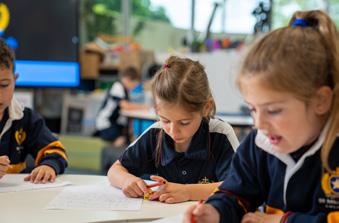







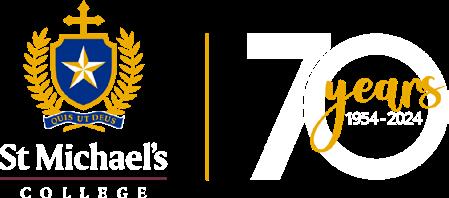


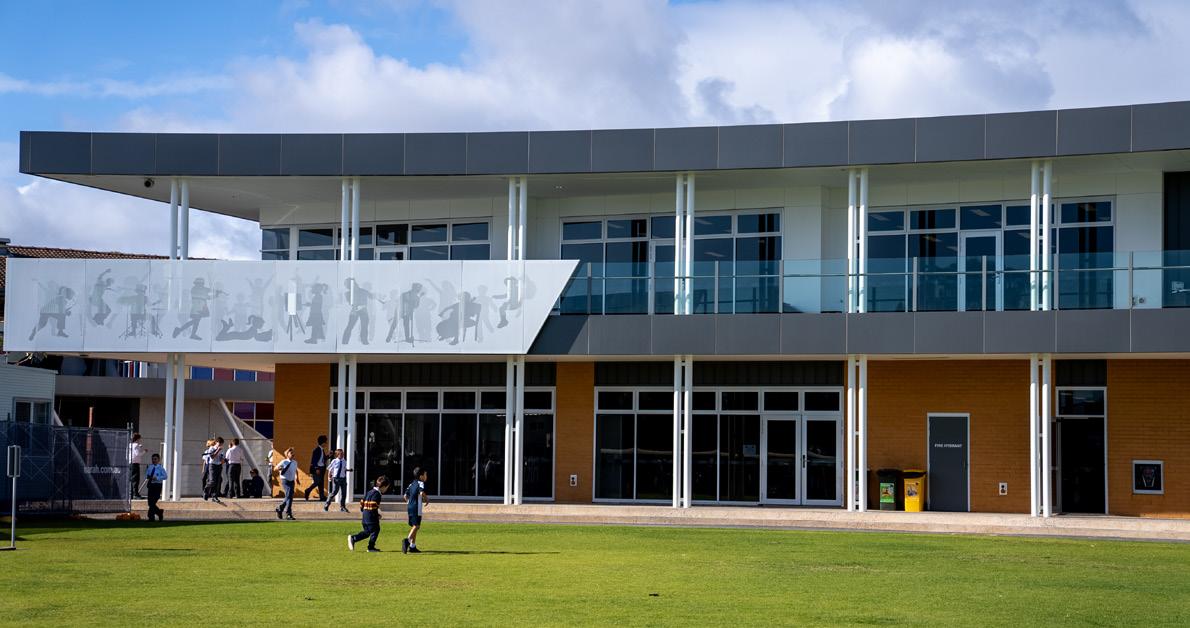

Primary Campus Building Works
Stage 3


Secondary Campus 10 Year Master Plan
STEAM Centre and Senior School Centre Artist Impressions



A+ to E- Grades used for all subjects in Years 7 to 10
A band Excellent achievement of what is expected at this year level
B band Good achievement of what is expected at this year level
C band Satisfactory achievement of what is expected at this year level
D band Partial achievement of what is expected at this year level
E band Minimal achievement of what is expected at this year level
F No work has been submitted, a score of zero has been obtained NA Not Assessed
Student achievement is referenced against the Australian Curriculum Achievements Standards in a learning area or subject being studied. Demonstration of performance is required when making judgments about the standard and outcomes. Finer grade level distinction is made using + or – i.e. A+, A, A-
A+ to EGrades used for Year 11 subjects and the PLP (Year 10) and Grades used for SACE STAGE 2 subjects
A to E Grades used when reporting to the SACE Board at Stage 1 (Year 11)
P
P for Pending may be used for the following compulsory SACE Stage 1 subjects: English (Literacy), Mathematics (Numeracy), and the PLP as well as Research Project - a compulsory SACE Stage 2 subject
Performance Standards, provided in each Subject Outline, are used to assess and report student achievement. These standards describe in detail the level of achievement required to obtain each grade at Stage 1 and Stage 2.
Years 7 to 10 students completing Individual Education Plan Subjects (Learning Support) work on tasks designed to meet negotiated outcomes. Parents/Caregivers are informed of this process at the implementation stage.
Year 11 students complete an adjusted Stage 1 Learning and Assessment Plan. They may have restrictions placed on their Stage 2 subject choices.
Years 7-11: Each subject will have a number of indicators, two of which are Application to Study and Behaviour in Class The other indicators are designed specifically for each Learning Area using the Achievement Standards (Australian Curriculum, Years 7-10), and Performance Standards (SACE Stage 1 Subject Outlines) and will therefore vary from subject to subject.
Year 12: Each subject will have Application to Study and Behaviour in Class as indicators, as well as an individual written comment.
Subject Indicators will have the following levels:
• Excellent • Good • Satisfactory
• Inconsistent • Unsatisfactory
Application to Study refers to the student’s overall commitment, in-class participation (questioning and responding, collaborative learning, learning through individual and group work), and the ability to focus in class, take responsibility for learning, self-evaluate and self-manage homework, revision, wider/extra reading, attention to detail, determination, and initiative to extend the boundaries of personal knowledge of the subject.
Excellent Completes all set tasks and meets deadlines. Highly motivated, works diligently in class.
Good Completes all set tasks and meets deadlines. Works very well in class.
Satisfactory Generally completes tasks, meets deadlines and works well in class.
Inconsistent Often not on task, fails to meet some deadlines. Needs to show more selfmotivation
Unsatisfactory Poor concentration and self-motivation with little application to study
Behaviour in Class refers to the student’s interaction with other students and teachers in the classroom setting, analogous with common politeness, courtesy, the following of instructions for the keeping of good order, and particularly in being a positive influence on the community as a whole.
Excellent Listens carefully to and complies with teacher instructions, is courteous, considerate and respectful of others
Good Good level of cooperation and conduct in class. Is respectful of others
Satisfactory Usually co-operative with appropriate conduct most of the time
Inconsistent On too many occasions is uncooperative towards others. Attitude needs significant improvement
Unsatisfactory Often uncooperative, with a poor attitude towards the teacher, other students and the learning program
YEARS 7-10: Upon request, the College can provide information that clearly indicates your child’s achievement in comparison to that of other students in your child’s peer group at St Michael’s. This information will indicate the number of students in each of the achievement levels A-E.